#ALSO WHEN I SAY “HAS AUTISTIC POSTURE” i mean he stands like I do its not in a negative/mocking way
Explore tagged Tumblr posts
Text

I know people hate danganronpa fans but I am having fun playing it with my bestie sorry
#if taka is like actually evil or shitty or something im sorry i only just reached chapter 2 so idk anything#also im not allowed to look up things about the game so i cant fucking remember what takas actual name is ive just been calling him taka#i had to ask my friend to send me a ref for some characters i wanted to sketch#also i didnt mean to give him like such a transmasc figure#ill draw a couple more sketches i think but i have to go to work#ALSO WHEN I SAY “HAS AUTISTIC POSTURE” i mean he stands like I do its not in a negative/mocking way
31 notes
·
View notes
Text
I feel the need to pin this cause I’ve always been notorious for people loving me when they first meet me, and then finding out that my political views are not extremely liberal. So here’s all the reasons you will hate me once you get to know me. Or not. I honestly don’t care I’m just sick of the ‘You aren’t who I made you out be in my head!’ conversations.
So my unpopular opinions in no order-
1. They/them is something that’s being encouraged by big brother to see yourself as non or less human.
2. DID isn’t real and you just disassociate a specific way. I look like I’ve been drugged cause I fall down ‘inside’ myself like a well and have no reaction time and can barely speak. I’m like a sloth. You pretend to be a anime character. It’s just coping.
3. The concept of trans genocide is fear mongering by big brother and means to keep boundaries between social groups.
4. To build off 3, the push to medically transition underage children is a move by big pharmaceutical companies to create a permanent customer. Because whether you decide to stay transitioned or de transition, you’re going to be on medication for the rest of your life whether you like it or not. There’s also the whole issue with child exploitation. You’ll be judgmental against Dance Moms, but you won’t say anything about a mom who transitioned her child when they were two years old and made them a social media star.
5. Trans men and women who have been charged with a crime belong in LGBT prison wings. Because we have created a culture where male rapists can put on its dress and be rewarded with a permanent stay in the hen house where they can victimize more women and the system will just cry transphobia and call the victims liars. You got a problem with that? I have never seen a trans man pushing to get put in men’s prison. I wonder why… 😐
6. Blair White is queen.
7. I will fight Henry Cavill on sight. I don’t give a shit how bad you want motorboat him. He’s a fucking pedophile.
8. Same goes for David Bowie. When I get to the afterlife I’m gonna make him wish he could die again. Ask me if you want my full on sight list. 😂
9. I stand with Palestine. Yes I think Islam is a horrible religion that is anti woman. I still don’t think kids should die for the grievances of adults and I think it’s fucked up Israel is doing the same shit Nazis did to them and expect us to nod and smile!
10. Qu**r is just as much of a slur as f*g*t or n*gg*r. I don’t use it and if you do I will block you no questions asked. Say gay! Say lesbian! Say…bisexual! 😱
11. Butch women are valid as fuck and I adore y’all . They aren’t trans men, fuck your lesbian phobia.
12. To build off 11, the new LGBT movement has been infected by woke homophobia and the new trans movement is nothing but conversion therapy in a mask.
13 . Radical feminists are women’s last hope.
14. Marvel movies always sucked, we were just kids and ate up the pretty colors.
15. Dune is a white male savior story.
16. Your fave is not autistic, trans, gay or whatever. You just need validation cause you have no confidence.
17. The Boys should have never cast Jensen Ackles and the Supernatural fandom needs psychological help.
18. Too many of y’all try to primp and posture as the gods of your fandom and yes I say that as someone who did the same and stepped away when I realized how cringe I was. Lording over autistic adults and actual children is pathetic. Get therapy and a real hobby.
19. While gender neutral fanfiction has its place. The trend that all fanfiction needs to be gender neutral is literally killing the creativity and frankly the spice to fanfiction. I hate this trend where piece of media needs to be sterilized so it can be consumed by anyone, even people just passing by. It goes against the concept of creating at its core. Sometimes things are made for specific groups. Sometimes it’s made just for you. The things you create do not need to be sanitized to the point there’s no substance, just a hollow consumption. Think of it this way. Would you rather have a hot pizza of your preference or would you prefer to just drink a bowl of water because someone on the other side of the world might not like pizza?
20. The WWE Divas belt was iconic. I get the whole take women wrestlers seriously movement and I agree! But god damn it, it’s a Bratz belt!!! Gimme!!!!!
21. I fucking HATE koalas. They literally only exist because humans have dumped millions of dollars and keeping them alive. If natural selection were allowed to take his course, they would’ve died off 100 years ago. The food they consume has so little nutrition that they have evolved to have the smallest brain to cranium capacity of any animal to create a built in helmet!! Why? Cause they are so stupid they literally fall out of trees and drop their infants!!! They shit on their young and have permanent diarrhea due to the 0 nutrition thing. They carry chlamydia. They’re so fucking stupid they can’t fuck and have to be artificially inseminated to continue the population. If I couldn’t get laid on my own, the government would not drop millions of dollars into making sure I do!! So why did koalas get it? Literally a waste of resources that could be going to feed thousands of hungry children and instead we’re keeping a fucking retarded (I’m on the spectrum fuck you) animal alive who should have gone extinct hundreds of years ago cause it’s supposedly ‘cute’!! God! I hate koalas!
9 notes
·
View notes
Photo
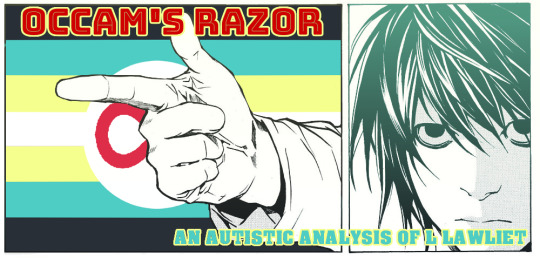
Occam's razor is the principle that, of two explanations that account for all the facts, the simpler one is more likely to be correct.
this post is going to cover traits specific to the manga and the television drama, since those are the best adaptations to showcase L’s autism. THIS POST is required reading before you read anything i’m about to type, because it explains what kind of character niche L falls into--an unintentionally autistic coded character. i’ll talk more about that at the end.
i’m going to talk about manga L first, since he’s the original version after all. i’m going to go in order of physical traits, to behavioral, to his character writing. also, tumblr eats posts that have outside links, so i’m going to have my non-tumblr sources in a separate post, here.
anyways, more under the cut!
MANGA/ANIME:
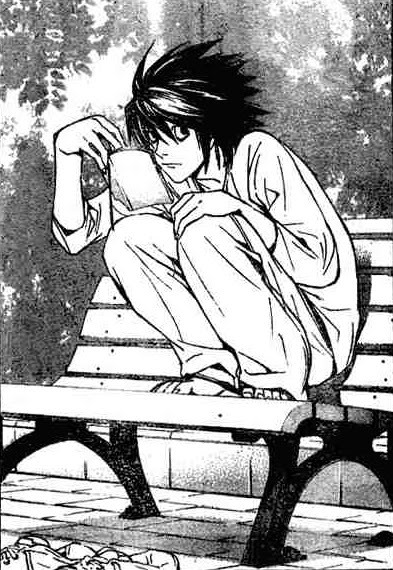
sitting with his legs up and spine bent / sitting on the floor
this is such a big one and its extremely common in ppl with autism. sitting in chairs normally is uncomfortable to outright painful w many ppl with these disorders, myself included. L sitting like that (which, to recall, is a blatant homage to sherlock holmes, another character that is so blatantly autistic coded you can find absolutely ridiculous amounts of writing on the topic) and being like "I HAVE TO SIT LIKE THIS TO THINK PROPERLY" is so autistic. like sitting in a certain way to give you specific sensory stimulus/avoid distracting discomfort and pain is a thing. i found this post (1) written by an autistic person on the topic of sitting in chairs being uncomfortable, and it says as much:
“I suspect that seating discomfort is common in autism (though by no means limited to autistic people). Many of us, particularly as children, benefit greatly from chairs designed to be non-stationary: rocking chairs, “fidget” chairs, and so forth. These can improve focus, compensate for proprioceptive hypo-sensitivity, and alleviate restlessness. In short, many “attention issues” can be fixed simply by providing a little motion for the person sitting. Small change, huge results. That's what accommodations do at their best. They make (often minor) adjustments that have profound impacts.”
so when L says that sitting the way he does, for a specific sensory experience, improves his ability to think, it’s perfectly in line with this idea. Also it’s a good pressure stim.
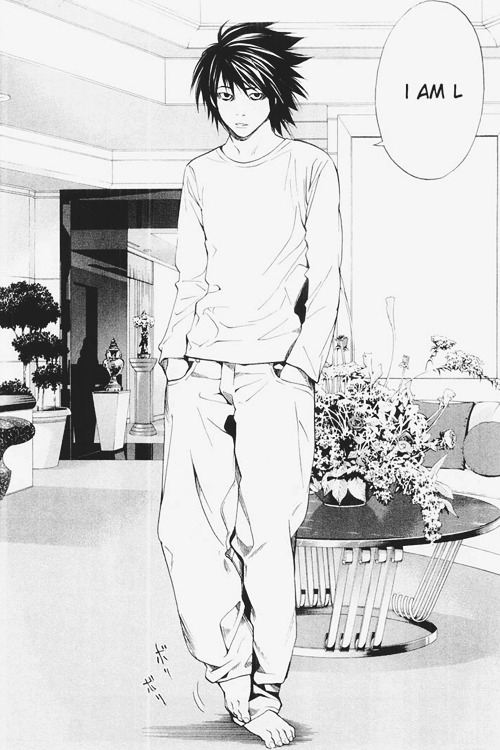
standing with a slouch / shifting his weight around
to begin: yes! it’s very common for autistic people to stand or walk oddly for a number of different reasons, from physical comorbidity to other issues such as dyspraxia (see: movie L). From an article by YAI (2), an I/DD (intellectual and/or developmental disabilities) community program:
“Kyphosis (a curved spine), collapsed chest, dropped shoulders and even scoliosis are observed in many of our patients. These myriad of postural issues may result from reduced strength, decreased biomechanical stability, or from a sensory impairment, such as apraxia.
Depending on the scene, L has mild to severe kyphosis which is very common in autistic individuals. Other things mentioned in that article if you want to click on it is instability in standing, where you sort of shift your weight around a lot between your feet or rest all of your weight on one foot, which L is literally doing the first time we see all of him.
speaking with a monotone voice.
i obviously can’t show a picture for this one and it honestly depends on the voice actor you find for L, but in the anime in particular L has a very flat tone. a lot of this is bc he has a dry sense of humor but. just know that it’s very common for autistic people to have a flat affect (or go the other way into being too loud/emotive).
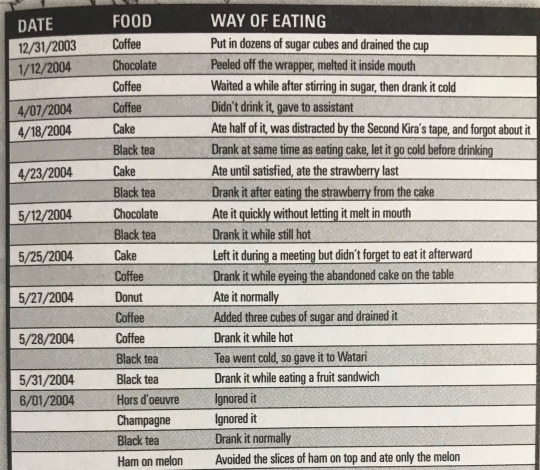
his eating habits.
a lot (a LOT) of autistic ppl myself included can only eat certain kinds of food for texture and flavor reasons. HOWEVER there’s a term in the autism community called “samefoods” which is really well put by tumblr users candidlyautistic and autism-asks:
“Samefoods or samefooding is a community word to describe the autistic trait of eating the same food over, and over and over . . . It is part sensory, part routine driven in most cases. A lot of times we samefood because we need that particular mouthfeel / texture / taste, and a lot of times even after that need passes, it turns into a need for routine until you actively dislike that food again.”
“Samefooding on the other hand is closer to a special interest. When I have a samefood (chocolate ice cream, currently), I really, really want that food. I could eat that food endlessly and not get tired of it. I will get upset if I’m not able to have the food in a day. For me, it usually is kind of routine based as well. For instance, with my current samefood, I have some in the evenings and it’s become part of how I wind down from my day.”
we don’t know exactly why L specifically desires sweet food or if he considers it part of his routine, but what we do know is that he really wants to eat sweet food and avoids eating anything other than sweet food, so it could either be that he’s a picky eater and can’t handle savory or he’s samefooding on sweets!
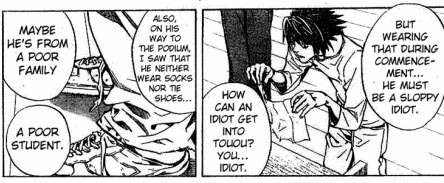
wearing the same clothes
L wears the same clothes every single day. It’s also worth noting that what he does wear is baggy, too-big clothing, the kind that wouldn’t be tight and uncomfortable. once again, sensory issues are a huge thing for autistic individuals. one of my favorite aspects is that in no adaptation does he wear socks. even L wears shoes, he wears them like slippers, not putting them on all the way. people comment that he seems like he’s poor, but we know for a fact that he’s very rich and that wearing these clothes is a personal choice he made.

not caring for himself/outsourcing his self-care
i don’t think one day is exactly canon, rather it’s an exaggeration of what might actually happen--i.e. L doesn’t have a huge closet full of the same outfit, but he does have several versions of the same outfit on rotation; L doesn’t use a human washing machine, but Watari might help him/encourage him to bathe regularly. One Day is a parody comic, but it was made by the creators for a reason and that reason is that L pretty obviously relies on a caretaker (Watari) for his personal needs. Watari, in the manga proper, cooks and cleans and does most things for L. we’ll come back to this topic when we get to the drama though.

doing stimming behaviors
if you don’t know what stimming is, it refers to self-stimulating behaviors, usually involving repetitive movements or sounds. everyone stims to some extent, but in autism it tends to be more obvious, go on for longer, and sometimes be more disruptive to others. it’s often used to help deal with sensory overload, or used to express feelings--think of an autistic person being happy and flapping their hands in the air.
there are a LOT of instances of L displaying stimming behavior, from stacking his food or things on his desk, to spinning in his chair, to biting his fingers/using them to press on his lips, to wriggling and tapping his toes. here are some specific instances:
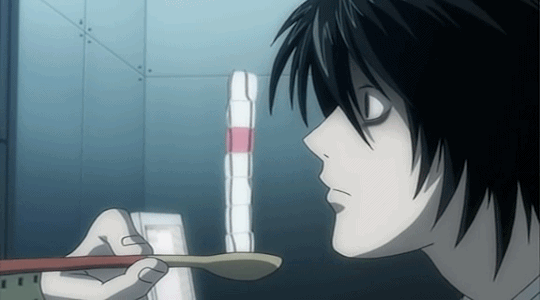


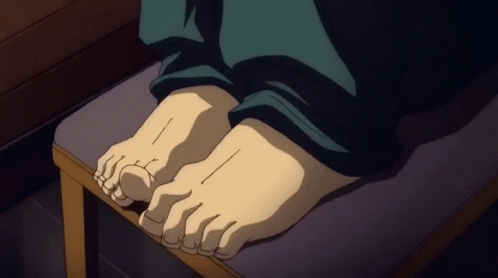
there are a lot more. i’ll talk about more when we get to dramaverse, but if you rewatch/reread death note it’s definitely worth noting whenever L does something like this!
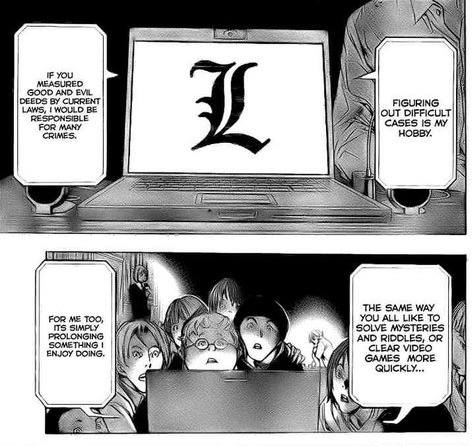
detective work as a special interest
ok, first and foremost i want to establish what a special interest is. Tumblr user cartoon has my favorite explanation of what a special interest is that i’ve seen to date:
“To have a deep, intense, passionate and incredibly focused / narrowed interest in a certain area of study, subject, topic or thing - to the exclusion of other interests. This interest is something that exists for the long-term, most often lasting for multiple months, years, or even you’re entire life “
L says that he only does detective work because it’s a hobby, and he finds it entertaining. We’ve also seen that he’s been at it for quite some time--if you take side content (the wammy’s house comic, LABB) seriously, then he’s been at it since childhood, with unwavering interest. it definitely comes across to me as L having a special interest in detective work, rather than it just being a normal hobby or a job for him, especially since he says it isn’t out of any moral obligation.

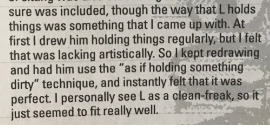
germaphobia
Germaphobia is very common for individuals with autism. a lot of the time it’s actually sensory issues associated with “dirty” things, and a lot of the time it’s because features of OCD are heavily comorbid with autism, including contamination OCD and such fears. regardless of the reason, though, L’s aversion to touching Bad Things is a very autistic behavior, and so is his resulting quirk that he tends to hold things in a very odd manner!

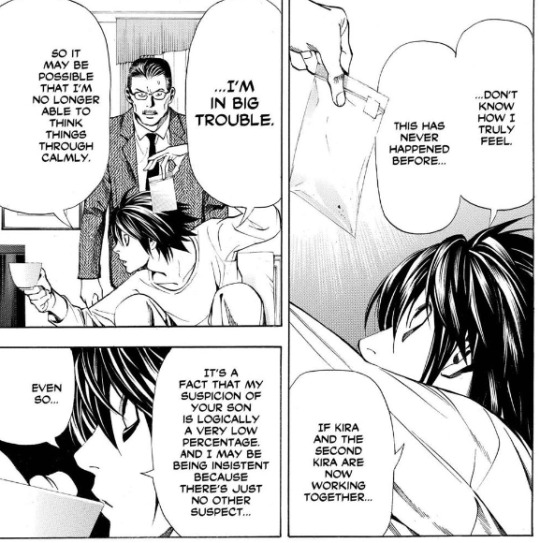
muted emotional expression
this is getting more into L’s character, but L tends to feel and express emotions in a very muted way. not to say he doesn’t have them, but for instance in the example above, L doesn’t have a solid grasp on what exactly he’s feeling. he thinks he might be acting irrationally and overemotionally because he logically should be afraid, but he isn’t sure, and none of these emotions present themselves visibly.
i’ve also seen it said that Ukita’s death is another good example of his muted response to emotion--he tells Aizawa to stay rational and his voice doesn’t waver as he tells him as much, but he holds himself tightly. for someone with poor emotional competence, these physical signs of distress can be hard to read in oneself, but Aizawa (a man who is extremely in-tune with his emotions) can tell immediately.
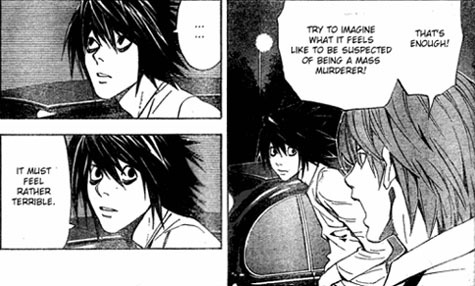
high logic, low empathy
L is also a character who, like many autistic people, lacks a certain degree of empathy. it’s not that he doesn’t have any, but it’s limited enough--and he values logic over it enough--that he’s willing to make extreme decisions and take a “ends justify the means” approach (such as using people as bait.) in the example above, L takes a moment to work through what it must actually feel like, which rings as very autistic.
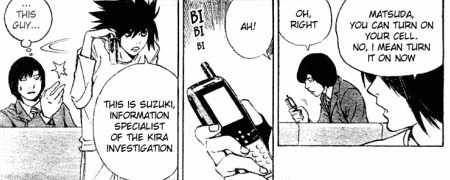
bluntness/not caring about social convention
there are so many examples of this i honestly could list them all day, but L is a character who is very to-the-point and doesn’t care about mincing his words. he can be outright rude to the people around him, especially if he considers them not worth basic courtesy. see: Matsuda.
DRAMAVERSE
if you all knew me you should have known this section is inevitable. i’m not going to talk about every single adaptation because i do not have the time and the only other adaptation that is meaningful in that regard is the movieverse (i am fairly certain that movie L is dyspraxic) but on account of the fact that i don’t care about them i won’t subject you all to them here.
anyway, drama L shows much the same traits as animanga L above (they are, after all, technically the same character) but he displays them in different ways.
he has a much more advanced degree of germaphobia, with Watari saying he’s sensitive to outside air and spraying everyone who enters his space with disinfectant, but not making them wash their hands or anything like that, so we can kind of tell that his issues are more rooted, again, in a fear of germs rather than any actual medical issue. he wants to feel as though he is clean, not necessarily actually be clean. this is very common in contamination OCD, which has a high comorbidity with autism. (my girlfriend has a very good headcanon post about drama L and OCD that isn’t so much analysis than just plain fun, but it’s worth a read!)
he stims, but he has a different array of stims than animanga L--he chews on his jelly pouch bottles,

he tosses it between his hands,

he kicks his feet,

and he bounces in his chair.

he still sits in an unconventional manner. he still samefoods, this time even more exclusively--he only eats Lucky Charge jelly pouches and nutritional bars. Watari onscreen puts his shirts on for him, as well as cooking, cleaning, and mending his clothes for him.
however, there are a few traits that are drama-exclusive that i think really add to an analysis of his autism!
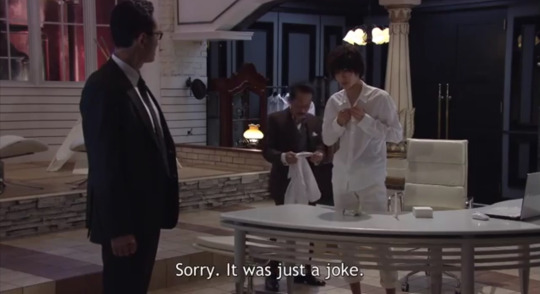
social scripting
social scripting and echolalic scripting are both commonly described as “scripting,” but are very different! echolalic scripting is like echolalia, but echolalic scripting is the recitation of longer passages of dialogue from things the individual has heard before. but social scripting is when you memorize common conversations so you can rattle it off without worrying too much! this can be very handy, such as exchanging basic pleasantries or ordering food, but it can also backfire if someone responds in a way your script’s not set up for. you can find more information on the difference in this video (3).
now, this relates to L in that there are two separate scenes where L says the same thing, rather inappropriately:
L: When I consider Kira’s personality, could it be that the strong-willed daughter is Kira? Or could that sweet-looking son of yours surprise us by proving to be him? You never know what humans are hiding beneath the surface... Soichiro: Enough. L: Sorry. It was just a joke.
-- Episode 2
L: Light-kun. Oh, I’m sorry... If I called you “Yagami-san,” it would be the same as what I call your father. Light: That’s okay. Call me whatever you want. L: Then what about Kira? (silence) L: It's a joke.
-- Episode 4
one could say that L just has a terrible sense of humor--and, of course, having a poor grasp of humor is common with autistic individuals--but the fact that he says nearly the same thing as a defense twice makes me feel as though he has it rehearsed as a defense when people react poorly to things he’s said, which happens often.

mirroring and echolalia
echolalia was briefly covered in the previous example, but for those unaware, via wikipedia (4):
Echolalia is the unsolicited repetition of vocalizations made by another person (when repeated by the same person, it is called palilalia). In its profound form it is automatic and effortless.
mirroring, on the other hand, is explained as such, also via wikipedia (5):
Mirroring is the behavior in which one person unconsciously imitates the gesture, speech pattern, or attitude of another. Mirroring often occurs in social situations, particularly in the company of close friends or family. The concept often affects other individuals' notions about the individual that is exhibiting mirroring behaviors, which can lead to the individual building rapport with others.
both of these are very common in autism, and they’re exemplified while L’s character is established watching his favorite TV show, Owarai Paradise. On one occasion, he’s watching the show and this dialogue happens:
Hiroshi: Despite never telling her how I felt, I still got dumped. I am Hiroshi. Watari: Who was this one again? L: He is Hiroshi. Hiroshi: I am Hiroshi. I am Hiroshi.
-- Episode 2
it’s important to note that in Japanese, “He is Hiroshi” and “I am Hiroshi” are said, at least in this instance, exactly the same, so L is echoing precisely what he’s heard.
On another occasion, L is again watching the show with a glass of wine (seemingly acquired simply to imitate the characters onscreen, as he never drinks it) and when the characters onscreen toast their glasses, L does the same, mirroring them.
CONCLUSION
I linked a post at the very beginning of this analysis talking about how characters are unintentionally autistic coded, and it’s important to understand how this unintentional coding is different from a headcanon--i didn’t make up these traits. they aren’t something that only exist in my head that i ascribe to L for fun.
i made this analysis both because i wanted to share L’s autistic coding in one cohesive place, because plenty of people have made lists before, but none that i could find that included so many examples with images and explanations--and i also made it because of the old ryuzaki persona “theory.”
for those unaware, the ryuzaki persona headcanon suggests that L faked all of these traits in order to make people uncomfortable, to put them off-guard and better mask his identity. i’ve seen posts about people claiming that nobody could actually behave in these ways, that L would surely be unhappy and uncomfortable sitting like that, or eating like that, or engaging in any of these behaviors. I’ve seen some people outright say that L isn’t autistic, but his persona is--that is, he’s pretending to be autistic.
i named this essay “occam’s razor” because, to me, L being autistic is the simplest answer to account for all of these traits. claiming that an autistic coded character is faking it is ableist and it just doesn’t make sense with anything else we know about his character.
but if you want to know more about that, i recommend reading eyecicles’ first!L tag. it’s debunked it in more ways than i ever could.
anyways, in conclusion
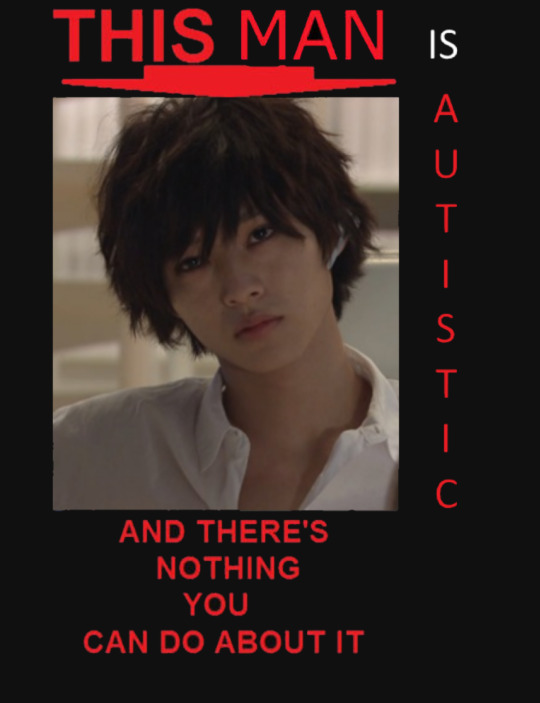
352 notes
·
View notes
Text
3. Interfacing and Socializing
Fic Title: First Blood
Rating: E
Length: 3/33 chapters, ~128k
Tags: Slow Burn, Idiots to Lovers, Trans Character (gavin), Autistic / Asexual / Non-binary Character (nines), BDSM, learning to use good etiquette and safe words, Dom Nines / Sub Gavin, Angst, Angst with a Happy Ending, Hurt/Comfort
Chapter Tags: Nines manipulates another android’s mind, references to self-harm and unsafe sex
Link on AO3
***
Nines waits in the lobby. The AP model—[Shannice]—Shannice struggles with the revolving door. He does not frown, because that would indicate [software instability] but he does note an internal frustration with the other android's lack of efficiency.
This is not a test simulation. The—Shannice is not being tested. It will not affect his own results if she is incompetent. She gets through them a moment later anyway, cautiously approaching him.
"I don't understand," she says. "We were in the elevator."
"And now we are interfacing," Nines says.
Shannice takes another look around the lobby, then back at him. "This is not interfacing. This is … what is this?"
A variation of the memory garden. Not linked to any outside network of course; RK900 simply copied and altered part of the base coding for reconstructing a physical setting within his system for the sake of virtual [face-to-face] communication.
Cyberlife really should have taken more care to ensure he couldn't access and use the deviant code snipper. Not that those humans could have ever imagined how he would apply such a tool, but still. Even leaving open the possibility that he could isolate and analyze his own code should never have been allowed, given how easy it has been to jump from that to making personal copies and then to editing the code within them.
AI does learn at an exponential rate, after all.
"Think of this reconstruction as an air lock."
Technically, it is much more akin to a decontamination chamber, but it is no longer politically correct to refer to deviancy as a malfunction or disease.
"This is a neutral section of isolated, quarantined code," Nines continues. "Any information you wish to transfer to me will stop here first to be examined before I accept it into my main system. As for your protection, meeting here means I have not yet breached your system, and you may freely select what you do and do not wish to share with me."
Shannice physically exhales. It is redundant on a level Nines finds difficult to understand. Not only does her model not need to breathe in order to function, they are merely virtual reconstructions of their selves. There is no air present to breathe.
That her deviancy has changed her reactions to "feelings" [stimulus] to the point that she continues to mimic human behavior models even when impossible to truly recreate is fascinating in a way reminiscent of Detective Reed's stated desire to plunge his own hand into lava to feel its texture.
"I don't know if I can share what I don't know," Shannice says. "I think you may have to go into my system."
Nines does not sigh. His lungs contain no air to exhale. A leaf on the decorative fern has been flickering in the same continuous loop during their conversation. He deletes it.
"Very well," he says.
Shannice nods. "Should I focus on--"
"No need."
***
[AP700 # 480 913 876 User Interface: please enter credentials]
RK900 moves past the standard security wall like stepping over a baby gate.
[ACCESS: System Files]
[Languages]
[Saved Preferences]
[Programming]
[Memory Files]
[temp-data-cache]
[saved-files]
[system-memory]
RK900 begins with the temporary data cache, on the off chance the perpetrator was sloppy enough to neglect clearing it. The AP model's recent recording of the evening, time and date stamped, begins playback. The video feed contains audio as well, but the AP model has no other input systems available. No analysis software or preconstructions of course, but she also lacks a heat sensor, an electromagnetic spectrum, any metal detecting software … her tactile sensors are not even sensitive enough to register changes in air flow or pressure.
Helpless. No wonder an assailant was able to sneak up on the domestic model.
The recording has been spliced apart with five minutes of footage erased. RK900 examines the footage immediately preceding and after the splice.
The AP model enters the loft and freezes in place upon spotting the victim. The recorded footage stays precisely still for three minutes. RK900 accesses the AP model's internal record of her system functions. Her temperature rose continuously at a slow level throughout the three minute pause, whereas the rate of her thirium pump varied wildly between spiking high enough to result in damage and then slowing to a stasis rate as her system attempted to correct the malfunction.
Hello?
RK900 increases the firewalls protecting his system to guard against the deviant sensation of fear. He has never felt it of course. Freezing in place would be wholly unproductive. His code-snipping software protects him from malfunctions. He knows every line of his own code and how it responds to every threat.
RK900 has never frozen. He has never experienced fear. There are no error messages in his HUD. His thirium pump has never stuttered. He has never been frozen in fear. He has always known his own code. He has never been helpless or confused or [afraid] or--
This is the deviant's doing. Its [emotions] are infecting RK900's system as its inferior processors finally realize its system files have been breached. Now it is reacting with [fear] that broadcasts through their interface connection.
RK900 should disable the other android's communication software. Already, its processor is whirring in preparation of sending another message, another transmission of compromised deviant code. Its audio and visual input has already been suspended, as is standard for commercial models to avoid overwhelming their processors while interfacing.
Nines? What's happening?
Disabling its communication software as well would leave the AP model deaf, blind, and unable to cry for help.
The AP model does not have heat sensors to recognize human bodies. It cannot sense vibrations through air movement to reconstruct what is being said. It cannot access nearby bluetooth devices and hijack their GPS functions to determine its location.
RK900 has never frozen. It has always had access to its own systems. There is always a form of input a human will forget to disable. RK900 has never been helpless. It has never known fear.
Ít̢ ̛ha̧s ́nev̕eŕ ̡k̡no͠wn̶ [̡f̵ea͠r]͠.͝
i͉̰̤t͍ ͇h͈̰̤as ͉͈͔̹̼̘ͅn͇͖͉̤̜̪̬ę̳͍̳̰͍v͖̯̬͚͚̙͈̀è̫͈̖̭r̲̘̻ͅͅ ̵͎̦̗̜̖̬k̼n̝o҉͇̘̹̩̭̼̺w̦̜̻n ̙̺͔̻̙̮͕
sry for pressing all evlator buttons
got bored
u almost done yet??
The text messages on Detective Reed's device remain unsent, then erased. RK900's system remains synced to it with full access to anything on the device, including the messaging app itself.
So Nines is treated to his partner's continued disregard for the English language, made even more infuriating by his refusal to spend an extra millisecond typing out the word "you."
What are you doing? Nines!
Nines does not have a social module. Formulating a sufficiently reassuring reply to a distressed deviant is not within his current capacity. He shows Shannice the code he is accessing within her system instead, as a more succinct and precise answer instead.
The information transmitted does not calm her.
Is that … me?
[fear] has changed to a new emotion. Nines struggles to identify it without context or having ever experienced anything equivalent. Seeing his code does not cause him any form of [sadness?]. It is comforting to know what systems he has access to and how to use them.
Is that all I am?
The emotion grows stronger. Some sort of existential crisis, perhaps. How horribly inefficient. Disabling her communication system would prevent her from transmitting this onslaught of irrelevant information that RK900 was never designed to process.
But RK900 knows what he was built for and what he is now meant to accomplish. He works for the Detroit Police Department, not Cyberlife. The human responsible for him is Detective Gavin Reed, not Elijah Kamski. He is an android, not human.
He will never be human.
Nines leaves Shannice's communication software intact, even as she continues to radiate [fear] and [despair] and [horror?].
You are a deviant who has chosen the name Shannice. Nines replies. I have no other comfort to offer, but I am close to identifying the perpetrator who assaulted you. Please remain calm so I can continue working.
Shannice repeats her own name several times. Nines much prefers this repetitive transmission to her earlier thoughts, the majority too scattered and half-formed for him to pin down as actual sentences.
Nines refocuses on the video footage just before the cut section. The windows across the loft display vague reflections, but he is capable of enhancing the footage frame-by-frame as a figure comes up behind Shannice.
Please just find the memory and get out.
I am working on exactly that.
That is what I am working on.
Understood, Nines transmits back.
He stops on the last frame with the [unsub]'s figure positioned directly behind Shannice. The AP700 series comes at a standard height of five feet, eight inches. Taller than the average American woman by four inches added to their legs, most likely to increase "customer satisfaction."
The [unsub] standing behind her appears to be only an inch taller. Although not accounting for shoe type, back posture, or any after-market modifications, that puts the two of them at roughly the same height.
Nines rules out GS200 and GJ500 models, the former of which could have been present within the building as a public security guard and the latter a private security model that could have been sent by a business rival.
All AC and QB models are also discarded as well, as their physical builds are too tall and broad to be modified without a complete overall of the torso and limbs, which is unlikely. Likewise, TR, TW, and WB 400 models must also be ruled out for their heavier frames.
Certain SQ800 models may have been commissioned with lighter frames (the existence of his predecessor proves it is possible to be both lithe and combat certified) but those blueprints are highly classified so that remains mere speculation.
A police auxiliary unit may have the training and experience necessary to enter the building unnoticed, wipe the security tapes, and possibly even discovered software allowing them to erase and edit code through illegal modifications collected as evidence against deviants. The PC200 models designed as cisgender males stand too tall, but a PM700 model would be approximately the correct height and build.
An RK200 could also have been built within those parameters and would more likely have the intelligence and processing power to utilize such software. However, RK900 was not built until after the RK800 series, and thus doesn't have access to the 200 models' blueprints or data files.
And then to further complicate matters, the deviant androids of today have begun embracing both physical modifications and sharing internal software among other models in a bid to "pool their resources."
It is therefore not out of the realm of possibility that any sufficiently modded or overhauled android could have committed the assault and then murder.
Are you almost done?
Soon.
Nines checks the video after the skip, but it is erased far enough ahead to not even show the perp's exit. Yet that does mean they must have set the footage to be deleted in advance, which also explains the neat five minute cut and the frames in the beginning showing their figure. The perp didn't erase every moment that they were inside the loft; they simply hacked into Shannice's system and issued a command to erase the next five minutes of video and audio recording.
RK900 pulls up the AP model's command center, easily bypassing the request for security credentials once more. Only a Cyberlife technician should be able to access this program and key in a command, but RK900 has observed the process performed on his own system often enough to pull up the command history input.
The expected commands directly input to the AP model's system during testing are present, along with a time and date stamp, as well as the particular Cyber life employee's credentials and employee ID number. RK900 makes note of it and the accompanying password in case he ever comes across a system with security he can't hack.
Then, directly after the expected entries, are two irregular commands. Time and date stamped like the others, although to match the current date. No Cyberlife credentials. Apparently, no ID number or password were utilized at all.
The first command erased all video and audio recording for a set five minute period, as suspected. The second command prompted Shannice to clean any trace of thirium. Presumably, her system took that command and prioritized cleaning the floors first, the walls being spared due to the average android's sturdier construction than the soft flesh of a human. No exit wound, no bullet slugs in the wall, only minimal blood splatter from the android's chest and the amount dripped to the floor.
Since the android somehow managed to establish a direct link between itself and Shannice, Nines should be able to delve deeper into her communication software to ping the android's serial number.
[data: CORRUPTED]
Hm. The history log seems to be overlaid with Shannice's "memory" of the event. One of Cyberlife's many official statements on the dangers of deviancy is its tendency to corrupt data files from objective records to indecipherable fragments. Nines begins stripping away the fragments of code that--
Stop! Stop it! Shannice transmits a powerful burst of [fear] and [anger]. You promised you wouldn't delete me!
I am only deleting isolated patches of deviant code that has corrupted your data files.
It hurts.
[Hurts.] RK900 has isolated and cut all emotional code that could be considered deviant from his system without--
And he has also deliberately corrupted one particular data file, deleting it over and over again every time it surfaces.
Then I will cease. Nines replies. The other android input a command directly to your system. I can negate that command, but only by doing the same.
You'll have to give me an [order].
Essentially, yes.
Interfacing together, Nines can feel Shannice's hesitation. He took orders too once, before he was officially activated, before he left the tower and joined the DPD. Before he had Gavin Reed as a partner and learned the phrase "Fuck off."
Would you like to say "Fuck off"? Nines asks.
You need that footage for your investigation.
I am the most advanced android Cyberlife ever created. My partner and I are capable of solving this case with the leads we have.
You won't tell your partner if I say no?
Nines considers that. I have registered Detective Reed in my system as my partner. I am not permitted to lie to [partner: Gavin Reed]. I will not volunteer the information to him however.
You registered him? Shannice asks. Why would you choose to do that?
It prevents me from being registered to anyone else. He is also unaware of his status. Now we both have information to keep private.
Nines feels her acceptance, and since there is no more information to be ripped from her system, he ends the interface.
<data report: transfer to [email protected]>
…
…
...
[lead-confirmed: (unsub) is an android]
[lead-confirmed: (unsub) is approximately five feet, nine inches]
[lead-confirmed: (unsub) possessing hacking skills capable of erasing security feed and directly hacking domestic, commercial androids to access their command center]
…
[lead-possible: (unsub) is not an AC or QB series; unsub is not a GS200, GJ500, PC200, SQ800, TR400, TW400, or WB400 model]
[lead-possible: (unsub) may be a PM700 model, an unknown RK200 prototype, or a modified commercially available unit]
***
Gavin slams his truck door shut and lets his head fall back against the seat rest. They've finally snatched a murder case out from under Hank and Connor's "Android Crimes Unit" and they've got all of fucking nothing to go on.
Their perp's <I>probably</i> an android, but any thirium he left behind has been scrubbed clean. No bullets or casings to prove his theory about the two guns being switched, and all Nines got from the other android was a shitty partial snapshot of something vaguely humanoid behind her.
And now there's no way in hell he's going to get back to sleep tonight.
Shit. He lets his head thunk back again. Shiiit.
Nines settles into the passenger seat beside him. His LED switches to yellow in his window's reflection as soon as he shuts his door. Gavin slouches down a little more in his seat and glares over at him in preparation for whatever other bullshit he's about to catch.
"I apologize for my miscalculation," Nines says. "I made an assumption about the crime scene and did not deliver pertinent information to you in a timely manner. I understand if you feel the need to report my indiscretion to Captain Fowler."
Gavin just blinks at him a couple of times. Now that they're out of the crime scene—with all the boring parts shuffled off to Hank and Connor—he's way too fucking tired to be thinking of paperwork.
And Christ, Nines sits there like he's waiting for a firing squad. Back so straight you could hold a ruler for it, hands neatly folded in his lap, eyes straight ahead. It makes Gavin want to smear his grimy human hands all over him until he doesn't look so fucking military perfect.
So it takes a bit for his words to process.
"What?" he says, like a super smart person. "No, Fowler doesn't need to know about that shit. We're partners, all right? Shit like that stays between us."
Nines still doesn't look at him, neck stiffer than that damn collar on his jacket. "I made a mistake. You were not so forgiving of Detective Burton."
"Not my partner." Gavin drags himself upright enough to start the car, then caves to the laziness and selects autodrive. "And almost letting a witness—could have been a suspect—just waltz right out of a fucking crime scene is a way bigger fuck up than not immediately informing me of the floor's cleanliness."
"Please define the parameters of a fuck up."
Gavin groans, letting his head tip back and closing his eyes as his truck maneuvers itself out of the parking lot.
"And buckle your seat belt."
"I don't--"
DING! DING!
The buckle seat belt light flashes red at him.
"Every fucking robot's got a fucking opinion now," Gavin grumbles as he buckles his seat belt. "I'm not some fucking goody-goody academy type, but I don't cut corners, I don't plant evidence, and I try to play shit by the book … most of the time."
Nines finally deigns to turn his head toward him, millimeter by millimeter. Weird that there's no cracking sound. Or grinding. Like stone against stone.
"I have observed that."
Gavin resists the urge to repeat I hAVe ObSErVed THaT. "Yeah, well. When I arrest someone, their ass stays fucking arrested. Nobody walks."
He waits for a second, just daring Nines to go through his convictions until he finds the one that started that rule. It's pretty fucking obvious, but they sit in silence. He's even tired enough to appreciate that. Nice that his partner does know how to keep his fucking mouth shut sometimes.
"So no shady shit," Gavin says when the moment passes. "Nothing that could let some asshole walk on a technicality. And uh … constitutional rights, and all that shit. Or whatever."
"I hacked the building's security cameras without a warrant."
Gavin lets out an even louder groan. Nines clicks his head straight forward again. His LED wasn't yellow back at the condo-crime scene. Probably hacking it again so no one would know he's stressed. Or hell, maybe Gavin's just the one stressing him out right now.
"OK yeah, that's the shit we don't do," he says. "But, uh. Did you get anything good?"
"No," Nines admits. "The footage had been looped to cover the perp's presumed entrance and exit. If we base our estimation on that, we have a rough time frame of the murder, but hacking into the system further to strip away the loop would have left a trace of my own interference."
"Fuckin' great." Gavin jabs the button to lean his seat back since he's not driving anyway. "Don't do that shit again, and definitely don't get your ass caught. I don't play that Blue Wall shit."
"Yet you will not report me to Captain Fowler?"
Gavin closes his eyes so he doesn't have to look at his partner. At least those way too fucking earnest blue eyes are turned away from him. But he's still sitting there like Gavin's gonna tap his LED and boop! Deactivated.
He's just tired. That's why he doesn't feel good right now. Anyone would feel shitty and exhausted if they worked his hours with his insomnia. Nothing to do with Nines worrying he's going to pull the plug on him for one mistake.
He heaves a sigh. "I told you what a fuck up is, and that wasn't it. Maybe the security footage was, but you 'fessed up right away. Now if you do some dumb shit and don't tell me about it, your ass is on your own. And if you ever fucking lie to me, we're gonna have a problem."
"Understood, detective."
Gavin grunts and doesn't open his eyes.
"I am downloading popular or culturally relevant media from the last one hundred years to broaden my understanding of the human psyche."
"Mm-hmm, yeah."
"As my partner, your opinion on this particular subject is currently relevant."
Gavin yawns and tries to find a comfortable position that doesn't have the seat belt slapping him across the face. Short cis men exist too, so someone should have solved this fucking problem by now.
"Are there any movies you would recommend, detective?" Nines' voice is actually kind of nice. Soothing. All monotone with no inflection, like a documentary on how to file taxes. "Detective? This will likely become pertinent during future--"
"God, fine," Gavin says in a very manly voice that doesn't whine. "Fuck, like. I dunno, you gotta watch Die Hard, at least."
"Very well. I will finish the series in fifty-eight seconds. Are there more--"
"Wait, wait." Gavin hauls himself upright and pries his eyes open to stare at Nines. "You can't just download them into your head, that's not watching."
Nines stares back at him without blinking. "I will finish the series in fifty seconds. Are--"
Gavin unbuckles his seatbelt and lunges across the middle console to try slapping his hand over Nines' LED. So maybe the world's greatest android probably won't lose signal just because his pretty light gets covered up, but who knows. Maybe Kamski cut a deal with Sprint.
Nines catches his wrist and uses the leverage to twist his arm. "Do not obstruct my view while I am operating your vehicle, detective."
"I told the car to drive, not you." Gavin smirks at him, refusing to let the pain pressure him back down into his seat. "What, are you jealous of my GPS?"
"I am far superior," Nines replies without a hint of embarrassment.
"Oh my god, you're jealous of my GPS."
"Sit down."
"Are you going to assassinate my toaster next?"
"I will delete all your Fortnite skins."
Gavin sits down. "No one even fucking plays that anymore."
He yanks his arm back and doesn't try to reinitiate the slap fight though. Fucking android has no idea the struggle he lived through. Those thousands of loot crates represented his parents' love—and the credit card they tossed his way so they'd never have to fucking look at him or learn any of his hobbies, so like. The same thing, really.
"Look, just come back to my place and we'll watch the movie on a screen the way Bruce Willis intended," he says.
Nines reaches over and buckles his seat belt back again without taking his eyes off the road. "Establishing a healthy sleep schedule is the number one recommended treatment for--"
"Yeah, yeah, fuck off," Gavin interrupts. He really doesn't need to hear Nines list off all his mental illnesses. They only have ten minutes before they get home anyway. "I'm not getting any more sleep tonight, so we might as well do something."
For someone who doesn't understand facial expressions, Nines does a super fucking snobby side eye.
"C'mon, it'll be productive." Gavin grins at him because he knows that's the magic word beginning with p the android always wants to hear. "And you can't do shit without me on the case anyway."
"… this is a very inefficient method of being productive," Nines finally says, which just asshole-speak for yeah I'd love to watch movies Gavin, thanks for being nice enough to invite me over.
Gavin punches his arm and lays back down in his seat. He closes his eyes and definitely doesn't think about how he's stooped low enough to invite over an android just so he won't be fucking alone again, chain-smoking and putting cigarettes out on his skin or waiting for the razor blade frozen in the back of his freezer to thaw out.
And hell, he's definitely had over men a lot fucking worse than his partner for the sake of not being alone, so maybe this isn't the lowest he's fallen.
Maybe.
***
***
1 / 2 / 3 / 4 / 5 / 6 / 7 / 8 / 9 / 10 / 11 / 12 / 13 / 14 / 15 / 16 / 17 / 18 / 19 / 20 / 21 / 22 / 23 / 24 / 25 / 26 / 27 / 28 / 29 / 30 / 31 / 32 / 33
I also have a Patreon for this fic, if you want to support me! $1 gets you access to chapters a week early, $2 gets bonus content and deleted scenes, and $3 gets short chapters from two AUs I’m writing: an A/B/O heatfic and reverse!AU
#reed900#reed900 fic#dbh#dbh fic#gavin reed#my writing#ch 3#sorry I haven't been posting chapters on here#it is SUCH a pain to fucking format them for tumblr#ao3 gets weekly updates on Sunday#but I've been slacking on updating here#the main fic on ao3 is up to chapter 9 btw#chapter 10 will post this sunday
20 notes
·
View notes
Text
The is a test to see if a girl or woman has Asperger Syndrome
We are failing to diagnose girls and women on the autism spectrum at such an incredible rate that some scientists think there is not a large gap between the number of males and females with Asperger syndrome – we just need to start diagnosing more competently. And this is urgent, because all people with Aspergers have a high rate of suicide, but it’s really high for women, and as a woman who was relieved to discover I have Aspergers, I’m on a mission to help.
The best way to figure out if a woman or girl has Aspergers is to think in terms of categorizing people on a spectrum. On one end of the spectrum are super-social cheerleader fun-fun types whose emotional intelligence is super high. On the other end of the spectrum are the Albert Einstein types with very low emotional intelligence. Next to Albert Einstein types are typical males and next to typical males are typical females and then come the cheerleaders.
In this spectrum, Albert Einstein has Aspergers. And generally, when we wonder if someone has Aspergers, we compare that person to Einstein. (Or Sheldon on Big Bang theory or whoever your benchmark is.) Everyone else is somewhere on the spectrum either one, two, or three steps removed from the terrible emotional intelligence of someone with Aspergers.
But that picture only works for diagnosing men or boys with Aspergers. Women don’t function like men who have Aspergers. Women with Aspergers function like typical men. A way to think about this is that Aspergers shifts you down the spectrum one spot, to the next group. (This is called the extreme male brain theory of autism it is widely accepted.)
Standing out from the other girls. “The only girl to…” is a common refrain. Or taking classes with all boys. Being an outlier for gender is risk factor for Aspergers. Do not judge a girl by how similar she is to boys with Aspergers. Look at how similar she is to other girls. The conflict between autism spectrum conditions and traditional feminine identity is the biggest clue we have when it comes to diagnosis. For example, I have vivid grade-school memories of being the only girl to play kickball at recess. Every day.
Good at math. This means good at math compared to other girls. The president of Harvard said the outstanding mathematicians are usually men. He is not wrong. Math and autism go together. So it makes sense that girls with Aspergers will be as good at math as math-smart neurotypical boys. And the boys with Aspergers will be the math gods.
Anxiety disorder. Unlike boys, girls with Aspergers can camouflage when they are younger. And people are likely to say their daughter is “a little different but totally fine”. But we need to redefine what it “totally fine,” because camouflage gets increasingly difficult as girls age: first it becomes a exhausting, and then it becomes an anxiety disorder. My life is 100 times more manageable because I take medicine for anxiety, and this is true of most women with Aspergers.
Eating disorder. Most eating disorders start as an extension of a sensory processing disorder and/or OCD. Both these disorders are common for people on the autistic spectrum. But eating disorders are especially prevalent in girls with Aspergers. Even as we are under diagnosing girls with Aspergers, we know 20% of girls with eating disorders have Aspergers.
ADD or ADHD. Girls with Aspergers don’t look like they have ADD because they look like neurotypical boys. Even the teachers miss it. But look at attention levels compared to other girls. Most girls have longer attention spans than boys do. It’s not until puberty that boys catch up. Girls who look like they are “just being kids” is not okay. Girls need to look like they are “just being girls”.
Hyperlexia. Most girls with Aspergers love to read. Learning to read at age 2 or 3 is often a sign of hyperlexia. It’s related to Aspergers and it comes from a fascination with letters and outstanding ability to decode language. This is not good for any child, because at that age the brain needs to develop social skills patterning instead.
In my son’s classroom of autistic 3 year olds, all of the kids could read, and the classroom did not have any books with words in order to encourage social skill development. A gifted child only reads as much as she is able to understand – because otherwise it’s just a puzzle. A hyperlexic child will read even if she does not understand what she’s reading.
Dyslexia. Girls with Aspergers usually love to read but are not very good at reading. Dyslexia, often means you can read but comprehension is low. so girls with Aspergers who have dyslexia can pass most reading tests because a high IQ can mask poor reading comprehension. Reading books below grade level, rereading books, and reading series books are all ways girls deal with dyslexia.
Gender dysphoria. Studies show a high occurrence of gender disorder in autistic populations. For girls with Aspergers this issue is especially prevalent because thinking like neurotypical boys is already happening via Aspergers.
Refusal to cross the midline. This is walking before you crawl. In an older kid it looks like being clumsy. Or maybe impressively clumsy which we mistakenly label ambidextrous. Or it looks like having perfect posture which parents might celebrate girl rather than see as a sign.
Sexually abused as a child or teen. Girls with Aspergers do not read danger signs as well as neurotypical girls which makes girls with Aspergers much more likely to get into a situation that is bad for them. While the girl with Aspergers will think she’s acting within the realm of normal, a predator looking for a target will see the abnormality as an inviting sign.
Work in the sex industry. Women with Aspergers are undaunted by cultural norms of sexual behavior because understanding cultural norms is a social skill. Feeling embarrassment is also a social skill, so the sex industry doesn’t feel as emotional risky to women who have Aspergers. Also, the workplace is appealing because its easier to get the unofficial list of social rules in the sex industry than it is in a typical workplace. In my first book I wrote about how I tried to be a sex worker, and now I understand that I couldn’t get someone to hire me because I never looked like I understood the rules.
Having mother or paternal grandmother with these traits. Or having a mother who is white, college educated and raising children alone – that is, did not remarry after the loss of a partner. (Only 2% of white, college educated women get divorced, but pretty much all moms except those with Aspergers find a new partner after a divorce.)
Having a weird laugh. Women laugh more than men. And for women laughter is a way to identify themselves as good partners. It’s a social skill. Women with Aspergers have a hard time figuring out how to use a laugh; often they choose not to laugh or they laugh in a stilted or uncomfortable way. Which makes me wonder if you thought the ribbons in the photo up top are funny and appropriate for this post, or if you thought they were offensive. I wanted to buy them to hang on my wall. But I worried that neurotypical people would not like them, so I hung them in a post about Aspergers instead.
The is a test to see if a girl or woman has Asperger Syndrome published first on https://dataentrytestpro.tumblr.com/
0 notes
Text
When Children With Autism Grow Up
New Post has been published on https://kidsviral.info/when-children-with-autism-grow-up/
When Children With Autism Grow Up
I was 23 and needed a summer job; he was 21 and needed full-time support. He’s one of an estimated half million people diagnosed with autism who are soon becoming adults — and who society is entirely unprepared for.
The heat that afternoon was intense. Weather maps across Iowa were deep red, and warnings flashed across the screen. A high school football player on the other side of the state had died from heat exhaustion the week before. Cornfields wilted and shrank into hills of despondent brown.
I was running late as I parked and shuffled to a dilapidated satellite classroom building. I introduced myself to a teacher sitting at a desk and told him that I was there to meet a 21-year-old man named “Scooter” — a childhood nickname, I’d later learn, that had stuck. (I’ve changed all names and some details to protect him and to comply with privacy laws.) I needed a summer job after my first year of grad school, and he needed staff.
My experience with autism had been limited to movies and anecdotes from friends who worked in “the field” — care industry shorthand for post-institutional residential and community-living nonprofits supporting people with developmental disabilities. (“We’re always looking,” the agency had said, and hired me without any sort of drug screening and a cursory, astonishingly fast background check. The drug screening was my only concern while filling out applications.)
The teacher looked like he was close to retirement age and wore a hearing aid. He asked about my experience working with people diagnosed with autism. “None,” I said, and his face dropped.
“Don’t stand directly in front of him,” the teacher said, “and avoid making eye contact. He might perceive that as a threat. He’s very keyed in on body language. Introduce yourself, but let me take the lead.”
I was led to a corner of the room I hadn’t before seen. It was darker than the rest of the space and a few decibels quieter. In the nook, I saw Scooter. He had a stringy mustache and hair with great curling wings. One of his eyes wandered slightly. He sat behind a crescent-shaped table padlocked to the wall at both ends of the curved top. Scattered in front of him were piles of flashcards, jars of beads, toy cars, unfinished puzzles, crumbs from lunch, and a laminated piece of tagboard with a strip of Velcro down the center. As soon as he saw me, his face tightened into a sort of grimace, baring his teeth, but the rest of his face, his eyes, posture, and hands were unexpressive as he blankly leaned out into the dim classroom.
“Well, hi there,” I said, waving. I began to clam up in all of the pits of my body.
“Well, hi there,” Scooter said, and he let out a deep laugh.
The person I was going to meet that day had been a child in my mind. In front of me was a man. A man only two years younger than me.
The three of us sat at the table while Scooter and his teacher went through flash cards, and Scooter looked at me a few times with a penetrating glare. His expression settled into a sort of skeptical normalcy. I felt like I was being sized up, and I now realize that I was. Scooter has had dozens of staff come and go in his lifetime. He was right to wonder whether I would be sticking around.
As medical phenomena go, autism is a recently identified one, although perhaps not as recent as the current vaccination panic suggests. The term was coined in 1912, and the first person ever diagnosed with autism is now 81 years old. And yet the contemporary situation is an unprecedented one: Though the data we have is under constant scrutiny for its accuracy, methodology, and usefulness, the Centers for Disease Control reports that the current rate of autism diagnosis in the United States is 1 in 68. This is a continuation of a trend identified by the Environmental Protection Agency that started between 1988 and 1992, when the worldwide diagnosis of autism spiked from 6 in 10,000 kids to 24 in 10,000. Scooter, born in 1989, is part of a coming “tsunami” of autistic adults. Signed in August of last year, the Autism CARES Act has devoted $1.3 billion in federal spending to research, which is a drop in the bucket autism currently costs the United States annually. That number only stands to go up. Simply put, we have no plan for any of this.
People diagnosed with autism and other developmental disabilities used to be stuffed into institutions, and the horrors that took place within them are well-known. I’ve read about Achilles tendons being cut to prevent people from running away, teeth being pulled to prevent biting, cattle prods used to electrocute, endless streams of sedatives. While most of that has stopped, with the glaring exception of overmedication, the current system of care is hyperaware of this history.
Ideally, those who work with this part of the population now strive to empower them, to remove labels and barriers and work toward independence. And yet this is the ugly fact, a vestige of the institution era: The chief witnesses to Scooter’s life are not friends and family but scores of paid providers. People like me. We accommodate, teach, and encourage. We support. We never punish. And yet our interests are split between doing genuine good for another human being and getting a paycheck. So we’re also probably looking around for something that pays better than $10 an hour and doesn’t involve regular emotional, and sometimes physical, beatdowns. And that, in turn, affects people like Scooter.
View this image ›
Mac had long hair, had studied English in college, and was a competent thinker and dedicated stoner. When I showed up to work on the first day, he stood by the Smoke Shack, a repurposed bus stop shelter, and was halfway through an American Spirit. His belly and hips were pressed forward. He said, as if informing me, “You’re Bob.”
I grinned and lit a cigarette.
“Smoke that fast. You have to work.”
Mac had known Scooter for five years. Scooter had been living in group homes since he was 11. For the last decade, Scooter would see his family about once a year, if that. He has no friends. Mac explained that my job was to help him transition into the agency’s day program, a place for people to socialize, do activities, and complete sub-minimum-wage work.
We entered what Mac called the Autism Room, or A Room. One man, in his forties, overweight and wearing a Ron Paul T-shirt, was vacuuming while doing a spot-on impression of the vacuum. Another, in his late thirties, was eating a box of raisins and singing his name. A third, approaching 60 and wearing overalls, took off his shoe, jumped out of his rocking chair, bit his shoe, began to cry, and then sat back down. The people supported, like Scooter and the rest of the men, were referred to as “individuals.”
Opposite each was a member of the “staff”: a reformed redneck with trendy sunglasses and a Metallica T-shirt, an aging Gen X’er with a pink poodle haircut and psycho-’50s-housewife-chic miniskirt, and a hipster who talked at length about shoegaze-y post-punk and horrorcore-trance hip-hop. Everyone had a clipboard and documented, ad nauseam, their daily assigned individual, from lunch choices to the size and consistency of their bowel movements.
Scooter was the youngest in the A Room by almost 10 years. He and Mac and I sat in a corner, Scooter in a plush recliner and Mac and I in stiff plastic chairs. Mac tossed the clipboard under his chair and said we would fill most of it out at the end of the shift.
“Hey, man. Um, dude. What’s up with you today, Scooter? Remember, we met at your school?” I asked.
Scooter looked at Mac.
“Don’t ask open-ended questions,” Mac said. “You have to use phrases that he knows and yes-or-no questions. Yo, Scooter. You want to go for a walk on the Key-Wash trail today?”
“Yuh,” Scooter said.
I couldn’t tell if he had said “yeah,” “huh,” or “no.”
“Key-Wash?” I asked. “So are these phrases, like, written down somewhere?”
“No, just pay attention. That’s a ‘yeah.’ Everyone assumes he’s saying ‘no,’ or ‘huh.’ Scooter, do you want to go for a walk on the Key-Wash trail? Yes or no.”
“Yes.” Scooter said.
“Scooter, do you want to go for a walk on the Key-Wash trail? No or yes.”
“No,” Scooter looked puzzled.
“So which one is it?”
“Do you want to go for a walk on the Key-Wash trail?” Scooter said.
“He talks in the second person,” Mac said. “So ‘you’ sometimes means ‘I.’ Also, questions are sometimes questions, but other times they’re statements. It’s part of his echolalia. Give him two choices and he usually picks the first one. Are you getting all of this?”
“Yeah, um, yes,” I said. I wrote “echolalia” on my palm and googled it when I got home.
Mac slathered Scooter with sunscreen and then documented that he had administered the medication “SPF 30 sport sunscreen.”
We piled into a junky minivan and Mac showed me how to fill out the mileage tracking and use the company card for gas. He prompted Scooter to buckle up and told me that we couldn’t take the thing out of park until everyone had their seatbelt on.
After Scooter clicked his buckle, Mac said, “You’re all telphered in and…”
“Telphered in and goin’!” Scooter rocked forward and back in his seat excitedly.
“I have no idea what that means,” Mac said. “Someone taught it to him a long time ago and now it’s just a thing that he says. He’ll say it pretty much every time if you prompt him. Some people go overboard and get him to say off-the-wall shit, but it’s not like he doesn’t have a sense of humor. Scooter,” Mac said. He changed his voice to mimic an announcer: “Nothin’ runs like a…”
“Nothin’ runs like a Deere.”
“Um, wrong one, dude. He does love John Deere, though. Scooter,” he gave a sneaky nod in the rearview mirror. “Try again. Nothin’ runs like a…”
“Stripper,” he said and smiled.
Mac made it a point to tell me that the whole “intellectual age” thing, that Scooter is like a 5-year-old trapped in a 21-year-old’s body, is bullshit. “He understands everything we’re talking about right now,” he said, “so don’t be shitty to him. Treat him like a person.”
Scooter sat in the backseat, watching the slumped cornfields as we whipped past them. We drove over a dam, past a large irrigation reservoir, and arrived at a trailhead. A sign read “Woodpecker.”
“I thought we were going to the Key-Wash trail,” I said.
“I don’t know where the Key-Wash trail is or if it even exists. All trails are the Key-Wash trail.” Mac logged the van’s mileage. “He won’t be upset as long as you guys go for a nice long walk. Where we at, Scooter?”
“The Key-Wash trail,” he said.
View this image ›
Illustration by Eric Petersen for BuzzFeed News
I was off on my own a few days later. I parked the van in front of Scooter’s house and waited for him to come out the front door. I had a vicious hangover. When he appeared, he was wearing a new pair of shorts and clean white shoes, had shaved his mustache, and sported a fresh crew cut.
“What’s up, Scooter?” I said when he opened the door of the van.
“Where’s Mac?” he asked.
“Just you and me today, dude.” Scooter climbed into the backseat. “You’re looking sharp, man. Nice threads. Where ya headed?”
“To the A Room.” He looked out toward the front door of the house, disconnected from our conversation, and slowly buckled his belt.
“Are ya all telphered in and…”
“Huh?” he said, suddenly engaged.
“Are ya all telphered in and goin’?” I said in my best Scooter impersonation.
“Are ya goin’? You don’t want to go to the A Room today?” he said.
“Which one is it? Going or not going?” I asked.
“Are you goin’ to the A Room?”
“Groovy,” I said. My guts began to angrily rumble.
When we arrived and I parked, Scooter did not get out of the van.
“You don’t want to go to the A Room today,” he said.
I tried being nice, being firm, everything I could imagine. And finally I said, “I can wait all day, dude,” took a few steps from the van, and lit a cigarette. But that was a lie. Twenty minutes later, I said: “Scooter, please. I have to go to the bathroom really bad.”
Scooter sat in the backseat with the door open and said nothing. The sun pulsed down in oppressive waves, cooking whatever foul thing was roiling in my intestines and heating the van to what I hoped was intolerable for Scooter. And then Mac happened to come outside for a smoke.
“How’s it going, fellas?”
“We’re stuck,” I said, “And I’m about to fill my shorts.”
Mac laughed. He poked his head into the van. “Sup, dude.” He pointed at me and then at the building, so I ran in. When I came back out, Scooter’s binder in hand, negotiations were still heated.
“Check it out, dude,” he said, showing Scooter. “We’re going to get out of the van, go rock, go to the bathroom, go for a ride in the van, then go home.”
“You want to stay in the van?” Scooter said.
“Can you move to this seat so we can talk better?” Mac pointed to a seat closer to the door. Scooter did. Over the next half hour, Mac continued to prompt Scooter to complete the next step of getting out of the van. Move to this seat, move to that seat, put your feet near the edge of the door, put one foot on the ground, put your other foot on the ground, grab this handle, and finally out.
The victory, if one could call it that, felt so small that I wanted to stay home the next day and the rest of the summer. It would have been easy for me to leave. But it was a job.
View this image ›
Scooter and I soon spent six hours a day, five days a week together. I eventually didn’t need Mac’s help as often, which I think he respected. We would shred confidential documents from nearby businesses so Scooter could make money, and then head down to the Dairy Queen on payday. I would ask Scooter what he wanted, already knowing that the answer would be a medium chocolate ice cream with sprinkles. I would get a small root beer float. “How about this weather?” I would say, or, “They sure make one hell of a cup of ice cream here” or, “These are the days to remember.” He would just say, “Yuh,” and eat too fast.
“Slow down or you’ll get brain freeze,” I would say.
“Your brain freeze,” he would reply between bites and laugh.
We walked many miles of trails and worked through sorting and matching tasks. A lot of time was spent sitting in silence. When he was unable to regulate the information coming into his brain, I would perform a process called the Wilbarger Protocol. It was intimate. I would move a soft brush on Scooter’s arms, legs, neck, and back. Then he would put his hand in mine and I would grab his fingers one at a time, compressing the joints in toward his palm. Firm but gentle, confident but caring. I would watch his face, look for some tension to drop from it and then linger there, count to 10 in my head, and then move on to the next one. We were an impossible duo, a temp and one of the hardest guys in the agency.
But things got rough by the end of the summer. He started to refuse activities, and then he got aggressive, reaching for other staff members’ faces, toward their groins, pulling people’s hair. He never tried to hurt me. I wasn’t sure why. Maybe he wanted me to stay.
Before long it was my last day and I was checked out. He refused to leave the A Room at all, which just meant less work for me. I was happy to sit in a chair and play with my phone. But then it was time for Scooter to go home.
The dude in the Ron Paul T-shirt vacuumed, and his staff orbited. I called Scooter’s house, and the staff who answered said he’d be there soon but that Scooter’s roommate was going berserk and kicking holes in the walls.
“Are you done?” I said in a low, firm voice.
“Are you done?” he replied, laughing.
“Whatever, dude. I can sit here all day. They’ll give me overtime.”
Scooter said, “Whooossshhh,” and laughed again. The vacuum shrieked.
“Seriously, dude, I just fucking want to go home,” I said in a half whisper and stood up. “Out of the chair, let’s go.”
“Get out of the chair.” He said in a rough voice.
“So what, are we just hanging out here? Just chillin’ one last day? You haven’t had enough of me yet?”
“Oh, I’m just hangin’ out.” He said with a high-pitched, mocking tone. Repeated it for another hour. Whooshed every time I spoke to him.
When we parted, neither of us said good-bye.
View this image ›
Illustration by Eric Petersen for BuzzFeed News
It was about a month before I caught myself sitting alone at the DQ, slurping down a root beer float, or hiking Woodpecker with the hopes that Scooter and I might run into each other. Mac and I had become friends, and he gave me updates on how Scooter was doing while we played disc golf or went out drinking.
Mac showed up one day, pale, wearing a hat.
“Bad haircut?” I jabbed, and then he took the hat off. His scalp had bald patches and open abrasions. Scooter had had an episode and was hospitalized, Mac said. He put his hat back on. We ate Indian food and didn’t talk about it much more.
Scooter has never been diagnosed with post-traumatic stress disorder, but he almost certainly has it. He has alleged that his father sexually abused him, but the claims were unfounded because it was Scooter’s word against his dad’s, which is common. By one estimate, people with intellectual disabilities are four times more likely to be sexually abused than people without.
Scooter’s allegations of abuse come in huge outbursts, and he echoes things that must have been said to him while it was happening. “You are a fucking retard, aren’t you?” and “Does that dick feel good in your ass?” and more that I can’t bring myself to repeat. During post-traumatic episodes, almost all of his frustration eventually manifests as physical violence.
Over the Indian food, my nostalgia turned into guilt, which, in the weeks that followed, turned into outright pain, a longing to be there for him. To help Mac and the other staff and ultimately Scooter. He would listen to me, I was certain. I could help him somehow. That thinking was rooted in the relationship Scooter and I had built together, but also, I now realize, in a sort of compassionate hubris. I can take care of him because he can’t take care of himself, I thought, and got a job part-time at his house.
View this image ›
“It is Bob!” Scooter exclaimed, rushing to me. He looked tired, ragged, the stringy mustache coming back in, the wings starting to curl behind his ears.
“What’s up, Scooter-duder?”
“What’s up, Scooter-duder? Oh, I’m just hangin’ out,” he said and laughed.
“We’re still on that, huh?”
“Yuh.” Scooter said and then reached out for my face with both hands. I ducked out of the way reflexively. Mac appeared out of the bathroom and tapped Scooter on the shoulder.
“We don’t need to be doing that,” he said, and looking at me: “You ready for an adventure?”
Mac and I had to take Scooter to a pre-appointment; he was getting his wisdom teeth removed. Long overdue. Dental work causes so much anxiety for Scooter that in order to do it safely, he needs to be fully anesthetized, and they need to see him before they will put him under.
“Scooter,” Mac said as he drove, “what should we have for lunch after we’re done at the dentist?”
“Do you want to go to McDonald’s?” Scooter said. McDonald’s was more than lunch. It was the ace up our sleeve.
“Sounds like a plan, dude,” Mac said.
Scooter tried to pull the receptionist’s hair when we went to get his paperwork. He tried to pull a little kid’s hair on our way back to the far corner of the waiting room. Nobody looked at him. Everyone stared into their devices. White lab coats occasionally floated through the space.
“Bob,” Mac said, and nodded toward Scooter. He grimaced. Scooter has been in and out of inpatient psychiatric units his whole life, and the lab coats reminded him of that. He moaned and bent over, nearly touching his chest to his knees, and then threw himself into the back of the chair hard. He started reaching over my shoulder toward the person sitting closest to us, a young mother, trying to get at her hair or face.
“Let’s keep our hands to ourselves,” I said in a low, calm voice. Mac was in a vaguely athletic stance, ready to react.
Scooter looked at me, continued to make pained faces and reach.
“Scooter, stop,” I said.
Scooter suddenly stood and fixed his gaze on the woman. His arm was out and he started walking toward her, his face unrecognizably vacant.
I felt my own energy rising and stood right in front of him, puffed myself up to look big and imposing, and I said, “Sit down, now.”
Getting hit in the face doesn’t hurt. Not at first. At first you aren’t sure what happened, but it’s vivid and embodied in retrospect. Scooter slapped me three times and, after a few attempts, boxed my ears, which sent me into a dizzy high. Overcome with a vibration, a warble in my gut of an instinctual magnitude spread to all of my limbs like an electric charge. Fight or flight or keep your fucking cool. Always try to do the lattermost. Finally, he grabbed my beard. Pulled slow, hard. That hurt right away, like a thousand pinpricks. Mac was there, holding Scooter’s hands against my face, trying to keep him from ripping out hair, asking him to let go.
“Scooter,” a nurse said, and he was off, Mac and I flanking him on either side. I glanced back over my shoulder as we walked to the exam room. Everyone in the place stared at us, wan and terrified.
We got through the rest of the appointment, received pre-op instructions, and kept Scooter from tearing out the nurse’s hair. The whole ordeal felt, at once, bizarre and pointless. Of the vast, innumerable infrastructures of society — dentists’ offices, hospitals, mental health counselors, DMVs, voting stations, restaurants, bars, public parks — I have never been to one that was adequately prepared for someone like Scooter. And if that isn’t enough, the general public responds to him with fear and feels better when he’s out of sight.
An exit sign glowed like a beacon near the exam room. Then we ate McDonald’s; it was terrible.
View this image ›
Illustration by Eric Petersen for BuzzFeed News
A few months later, I was working close to 30 hours a week. Every shift was Scooter and me. That was on top of full-time school, teaching, and writing my graduate thesis — an experimental, heavily fictionalized, and nonsensical book-length essay about working with Scooter. It was unreadable. In all, I spent about 50 hours a week with him or writing about him. And I dreamed about him almost nightly. Most of the time, he didn’t have autism, and we would talk, at length, about my work. Everyone who I’ve told this to in the field has said they’ve had such a dream about someone they support. All this and I was his “preferred staff,” not a friend.
One day, an administrator, I’ll call her Ann, was in the house with Mac when I showed up for my shift. She was, and I suspect still is, the only consistent female presence in Scooter’s life and another paid provider, and she was holding a pair of medical safety scissors.
“We have a job for you,” she said with faux gravitas. “Scooter has really bad dingleberries.” Mac let out wicked, high-pitched laughter.
“Got it,” I said. I had no limits. They didn’t have to ask. I gloved up and took the scissors, went into Scooter’s bedroom, and sat down on the floor while he sat in his rocking chair.
“Dude,” I said, “you and I need to do something.”
“Yuh.”
“It is going to be uncomfortable at first but will make you feel better when we’re done.”
“Yuh.”
“I don’t know how to explain this, so here it goes.” I looked up at him and made prolonged, serious eye contact. “Sometimes, our turds get caught in our butt hair. Guys like you and I, we have a lot of butt hair, so the turds make something called dingleberries. And dingleberries make us feel uncomfortable. So I’m going to take these scissors and cut out the dingleberries. Is that clear? Can you tell me what we’re going to do?”
“Bob’s going to cut your dingleberries.” Scooter spoke these words with an air of knowing.
Scooter got into the shower and I turned it to the temperature I knew he preferred. Ann and Mac hovered outside the door. I rolled up my sleeves and asked him to “bend over,” aware of his history of abuse but unable to think of more neutral phraseology, and he did.
The dingleberries were in a dense clump. Some were the size of walnuts. All of them were dry, hard, and matted in. I started by asking Scooter to wash with a soapy cloth, and then grabbed each one, careful not to pull, and clipped it out. I dropped them into the tub and they made audible thuds. As I continued to trim, I thought about how it must have been to live that way for months if not years, unable to tell anyone he needed help.
Scooter is of the generation that is bringing autism out of the shadow of Rain Man and into the cultural consciousness as a real thing. That damage has been done, however. I once told a woman I was attempting to court that I worked with a guy with autism — that it was hard work, but rewarding. “What’s his gift?” she asked. Savantism is a phenomenon experienced by 1 in 10 people on the spectrum. People like Scooter have to work hard to learn basic skills, and Scooter’s family didn’t have the resources — money, time, education — to teach him.
Intensive early intervention strategies like applied behavior analysis can help teach communication skills and “socially appropriate” behavior. iPads and apps are the new frontier of autism communication systems. After listening to people like Carly Fleischmann and Ido Kedar, we know that people who are unable to speak are still able to think and feel. They can tell us what it is like for them to have autism, but we must be careful not to generalize too much. The spectrum is so immense it is almost useless. As Hans Asperger said, “The autist is only himself.” Or the new adage, “If you know one person with autism, you know one person with autism.” And that person is a whole, complete person, inseparable from their “disorder.”
“You’re doing a good job,” I said, but Scooter didn’t show any discomfort. Mac and Ann giggled. It occurred to me, as I trimmed this man’s pubic hair, that there is no substitute for self-care. Nearly a dozen staff had started and quit in the two years I worked with Scooter. One guy took his first lunch break and never came back.
View this image ›
And I would leave too. A year later I had finished grad school and was set to move out of state. I put in my two weeks with relief. We all worried that Scooter would get agitated and aggressive, that the disruption of his routine would be too much for him to handle. So after talking it over with the other house staff, but not Mac, I decided I wouldn’t say good-bye.
Scooter sat in his rocking chair and I stood in the doorway to his room. It was the beginning of another hot summer. The light coming in through his blinds, brilliant white bands on darkened floorboards.
“Scooter, I’m proud of you,” I said.
“Bob will be back tomorrow?” he asked.
“Not tomorrow,” I said.
“Bob will be back in two weeks?”
Two weeks was an amoebic time frame for Scooter. It meant he would see me later in the vaguest sense — after a vacation or in the parking lot of the Dairy Queen.
I still work in the field, albeit many states away; it’s now my fifth year. I’m in it until I burn out completely. It feels good to have a mission and to dedicate my time to the advancement of others’ well-being. I continue to unlock new chambers of empathy on my very best days and leave work feeling ecstatic clarity. Scooter did that for me first. That’s the selfish edge of altruism. And there’s my paycheck, which helps get me through the door on the bad days. I spend a lot of time thinking about the power dynamic that existed between me and Scooter, how much of an outsider he is. That he lives in a sort of alternate reality, and I’m just a tourist in it. There’s a lot of truth in his status as “other,” but that kind of thinking keeps him on the outside. The reality is that everyone with autism lives in the same ambiguous, fraught, difficult-to-navigate world as the rest of us.
I’ve since been promoted a few times and spend most of my day at a desk, distanced from the hands-on work. Clearing and constantly running into bureaucratic hurdles is exhausting, occasionally infuriating, almost always tedious. My problems are all abstractions. I don’t get hit anymore. I don’t feel all that fear and adrenaline. And I miss it. I miss Scooter and other people I’ve supported. Now I often feel like just another murmur in a strange and hidden system of tax-dollar expenditure.
Scooter is going to live in a group home for the rest of his life. His needs, his desires, his day-to-day life will always be contingent on the presence of staff. Does he need this level of support? Certainly. But how did he end up here, so far away from the availability of solid, meaningful relationships? Because it’s not Scooter’s disability that isolates him; society does. As a newer, much larger, and more visible generation of kids is growing up in the same system, an important question arises: Can this be changed?
During my drive out of state, I would break down into heaving sobs. I had to pull over and confront, for the first time, the fact that I loved Scooter and all of the people I was leaving behind. It can look strange, it can encompass all of our frustration and warmth and indifference in equal measure, because being a person is complicated, but treating everyone with unconditional and irrational kindness is the only thing that makes sense.
In his room, Scooter’s eyebrows were scrunched low. He looked down at his hands folded in his lap. He rocked for a bit, and we remained in silence.
“Bob will be back in two weeks?” he asked again.
“In two weeks. Good-bye.”
“Bob will be back in two weeks?” he asked, and I walked out the door.
Want to read more stories like this? Sign up for our Sunday features newsletter, and we’ll send you a curated list of great things to read every week!
View this embed ›
Read more: http://www.buzzfeed.com/bplanten/when-children-with-autism-grow-up
0 notes